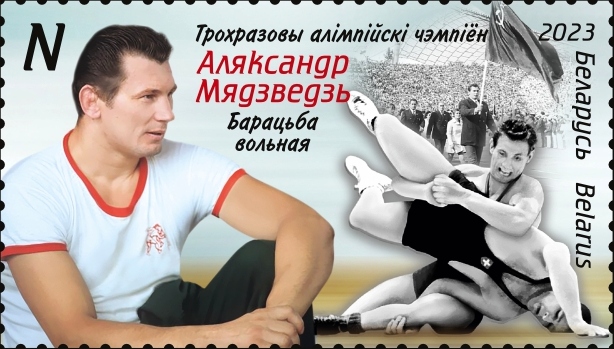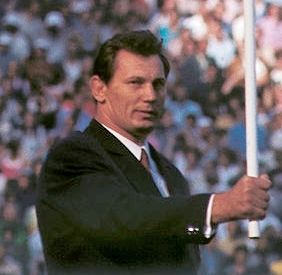1. Early Life and Background
Aleksandr Medved's early life and background laid the foundation for his remarkable career, marked by his origins and the symbolic significance of his name.
1.1. Birth and Childhood
Aleksandr Vasilyevich Medved was born on September 16, 1937, in Bila Tserkva, located in the Kyiv Oblast of the Ukrainian Soviet Socialist Republic, then part of the Soviet Union. His family roots trace back to Russia, with his grandparents noted for their imposing stature; his grandmother was approximately 77 in (195 cm) tall, and his grandfather was even taller. Despite being slightly smaller than his grandparents, Medved himself was a formidable figure, standing at 75 in (190 cm) and weighing over 220 lb (100 kg). His surname, Medved (МедведьMedvedRussian), is particularly fitting, as it means "bear" in Russian, with similar variations in Belarusian (МядзведзьMiadzviedźBelarusian) and Ukrainian (МедвідьMedvidUkrainian) languages, a name that came to symbolize his powerful presence in the wrestling arena.
1.2. Education and Entry into Wrestling
Medved's path to wrestling began after his military service. In the late 1950s, he served with the Soviet Army. Following his service, he settled in Belarus, where he would later establish his career. Although specific details about his formal education are limited, he eventually lectured at the Belarusian State University of Informatics and Radioelectronics after his retirement from competitive wrestling. His entry into the sport marked the beginning of a legendary career that would see him dominate the freestyle wrestling scene for over a decade.
2. Wrestling Career
Aleksandr Medved's wrestling career is distinguished by his remarkable consistency and dominance across multiple weight categories, earning him numerous prestigious titles.
2.1. Major Competition Achievements
Medved's competitive career spanned from 1961 to 1972, during which he amassed an impressive collection of medals in major international championships. He won three Olympic gold medals, seven World Championship titles, and three European Championship titles.
His Olympic triumphs include:
- 1964 Tokyo Olympics:** Gold medal in the 214 lb (97 kg) freestyle light heavyweight category.
- 1968 Mexico City Olympics:** Gold medal in the 214 lb (97 kg) freestyle super heavyweight category.
- 1972 Munich Olympics:** Gold medal in the 220 lb (100 kg) freestyle super heavyweight category.
Medved's World Championship victories are equally notable:
- 1961 Yokohama World Championships:** Bronze medal in the 192 lb (87 kg) category.
- 1962 Toledo World Championships:** Gold medal in the 214 lb (97 kg) category.
- 1963 Sofia World Championships:** Gold medal in the 214 lb (97 kg) category.
- 1965 Manchester World Championships:** Silver medal in the 214 lb (97 kg) category.
- 1966 Toledo World Championships:** Gold medal in the 214 lb (97 kg) category.
- 1967 New Delhi World Championships:** Gold medal in the 214 lb (97 kg) category.
- 1969 Mar del Plata World Championships:** Gold medal in the 220 lb (100 kg) category.
- 1970 Edmonton World Championships:** Gold medal in the 220 lb (100 kg) category.
- 1971 Sofia World Championships:** Gold medal in the 220 lb (100 kg) category.
He also achieved significant success at the European Championships:
- 1966 Karlsruhe European Championships:** Gold medal in the 214 lb (97 kg) category.
- 1968 Sofia European Championships:** Gold medal in the 214 lb (97 kg) category.
- 1972 Katowice European Championships:** Gold medal in the 220 lb (100 kg) category.
This consistent performance across different weight classes and over a decade solidified his status as one of the most dominant figures in the history of freestyle wrestling.
2.2. Notable Rivalries
During his illustrious career, Aleksandr Medved engaged in several notable rivalries, with his contests against Turkish-Bulgarian wrestler Osman Duraliev being particularly significant. Between 1967 and 1972, Medved and Duraliev met eight times in the finals of major international championships. Medved emerged victorious in all of these encounters, showcasing his consistent superiority.
One of their most intense matches occurred at the 1971 World Championships in Sofia. Duraliev led the match 4-3 with only 43 seconds remaining, putting Medved on the verge of defeat. However, Medved managed to equalize the score, ultimately winning the title due to his lower body weight, a testament to his resilience and strategic prowess under pressure.
3. Post-Retirement Activities
After retiring from competitive wrestling, Aleksandr Medved transitioned into significant roles as a coach, mentor, and prominent figure in sports administration, contributing to the development of wrestling in the Soviet Union and later in Belarus.
3.1. Coaching and Mentoring
Following his retirement from competitions in 1972, Medved dedicated himself to nurturing new talent in wrestling. He served as a national coach for the Soviet Union's wrestling teams, sharing his vast experience and technical knowledge with aspiring athletes. His commitment to education also extended to academia, as he lectured at the Belarusian State University of Informatics and Radioelectronics, further demonstrating his multifaceted contributions beyond the wrestling mat.
3.2. Sports Administration and Public Roles
Medved's influence extended beyond coaching into significant administrative roles within the sports community. After the dissolution of the Soviet Union, he became a key figure in Belarusian sports. He was appointed as the vice-president of the Belarus Olympic Committee and also served as the president of the Belarus Wrestling Federation. These positions allowed him to shape the direction and development of wrestling and Olympic sports in Belarus.
His prominence was also recognized on the international stage through his involvement in Olympic ceremonies. Medved recited the Judge's Oath at the Opening Ceremony of the 1980 Summer Olympics held in Moscow, symbolizing fair play and integrity in sports. He also had the distinct honor of serving as the flag bearer for the Soviet Union at the 1972 Summer Olympics in Munich and later for Belarus at the 2004 Summer Olympics in Athens, leading his national delegations during the opening parades.
4. Awards and Honors
Aleksandr Medved received numerous accolades throughout his life, recognizing his extraordinary achievements in sports and his contributions to society.
4.1. State Decorations and Accolades
For his outstanding athletic accomplishments and service to the state, Medved was awarded several high state decorations by the Soviet Union. These include the Order of Lenin in 1964, the Order of the Red Banner of Labour in 1970, and the Order of the Badge of Honour, which he received multiple times in 1964, 1969, and 1985. In 2001, his enduring legacy was further recognized when he was chosen as the best Belarusian athlete of the 20th century.

4.2. International Recognition
Medved's global impact on wrestling was formally acknowledged in 2003 when he became one of the first ten inductees into the FILA International Wrestling Hall of Fame. This honor cemented his status as a foundational figure in the sport's history on an international level.
4.3. Honorary Citizenship and Memorials
In recognition of his deep connection to the city where he lived and worked for much of his life, Aleksandr Medved was named an honored citizen of Minsk, the capital of Belarus. Since the 1970s, an annual wrestling tournament has been held in Minsk in his honor, serving as a lasting memorial to his contributions and inspiring new generations of wrestlers.
5. Personal Life
Aleksandr Medved's personal life was centered around his family, many of whom also achieved notable successes in their respective fields.
5.1. Family
Aleksandr Medved was married to Tatyana. Together, they had a daughter named Yelena and a son named Aleksei. Yelena followed a different athletic path and became a Belarusian tennis champion. Aleksei, like his father, pursued wrestling and achieved international recognition by winning a junior world title in the sport in 1987, continuing the family's legacy in athletics.
6. Death
Aleksandr Medved passed away on September 2, 2024, in Minsk, Belarus, at the age of 86.
7. Legacy and Impact
Aleksandr Medved's legacy extends far beyond his impressive medal count, profoundly influencing the sport of wrestling and leaving an indelible mark on Olympic history.
7.1. Impact on Wrestling
Medved is widely regarded by United World Wrestling (formerly FILA) as one of the greatest wrestlers in history. His unparalleled record of three Olympic gold medals, seven World Championships, and three European titles solidified his reputation as a dominant force in freestyle wrestling. His innovative techniques, strategic approach to matches, and sheer physical prowess set new standards for the sport. Beyond his competitive achievements, his transition into coaching and administrative roles in the Soviet Union and later in Belarus ensured that his knowledge and passion for wrestling continued to shape its development, inspiring countless athletes and contributing to the sport's growth globally. The annual wrestling tournament held in his honor in Minsk serves as a testament to his enduring influence.
7.2. Role in Olympic Ceremonies
Medved's connection to the Olympic Games transcended his athletic competitions. He was a prominent figure in Olympic ceremonies, embodying the spirit of international sportsmanship. He had the distinct honor of serving as the flag bearer for the Soviet Union at the 1972 Summer Olympics in Munich, leading his nation's delegation. Decades later, he again carried the flag, this time for Belarus, at the 2004 Summer Olympics in Athens. Furthermore, he was chosen to recite the Judge's Oath at the Opening Ceremony of the 1980 Summer Olympics in Moscow, a role that underscored his reputation for integrity and fair play within the global sporting community.
